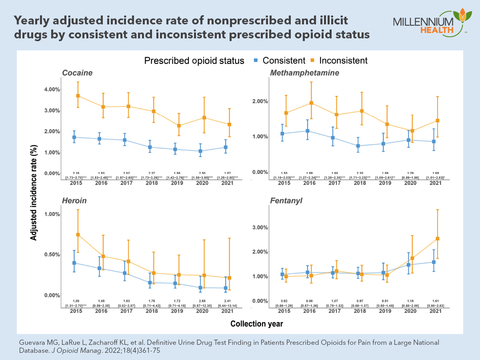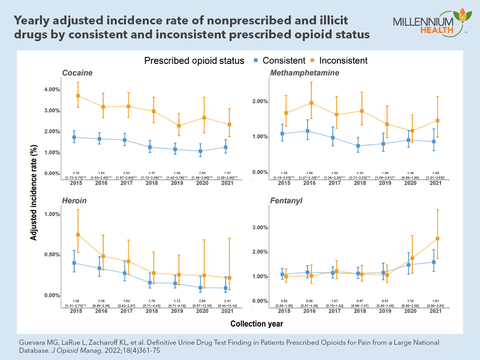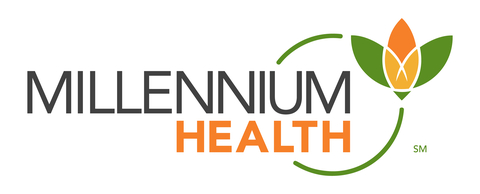SAN DIEGO, Calif.--(BUSINESS WIRE)--A study published in Journal of Opioid Management, led by Millennium Health researchers and co-authored by Kevin Zacharoff, MD, FACIP, FACPE, FAAP of Stony Brook University, explored the presence of illicit substances in definitive urine drug test (UDT) results in patients prescribed opioids.
Clinicians and policymakers have been wrestling with the appropriateness and safety of opioid therapy for decades. Policy and clinical decisions have often been made with limited data on current drug use in patients with pain. This study analyzed 600,000 urine specimens collected between January 2015 and September 2021 to see if those taking their prescribed opioids were less likely to be positive for the illicit drugs currently driving overdose deaths: cocaine, heroin, fentanyl, and methamphetamine. Findings included:
- Illicit drug positivity for the total population was low (<5%)
- Patients taking their prescribed opioid were 54% less likely to be positive for cocaine, 47% less likely to be positive for heroin, and 35% less likely to be positive for methamphetamine than those who were negative on UDT for their prescribed opioid; differences between the groups for fentanyl were not significant
“Clinically, the results of this study may be encouraging to clinicians who are prescribing opioids and monitoring patients via definitive UDT, as we showed that monitored patients in a pain setting had low positivity rates for illicit drugs, with the lowest rates in those taking their prescribed opioid,” said Maria Guevara, Pharm.D., CPE, Director of Clinical Affairs, Education and Training, Millennium Health.
“This research supports how definitive UDT can contribute to helping mitigate stigma and other concerns often facing patients and healthcare professionals regarding illicit substance use when long-term opioid analgesic therapy is appropriately employed to treat people with chronic pain,” added Kevin Zacharoff, MD, Faculty and Clinical Instructor, Department of Family, Population and Preventative Medicine at Renaissance School of Medicine at Stony Brook University.
The Journal for Opioid Management article can be accessed here.
About Millennium Health
Millennium Health is an accredited specialty laboratory providing medication monitoring via definitive urine and oral fluid drug tests to support improved clinical decision-making as part of treatment for millions of Americans with chronic pain, mental illness, substance use disorders, and other health conditions. Drug testing is used to obtain objective information about patients’ recent use of prescription medications and/or illicit drugs and helps monitor the effectiveness of treatment plans. We also conduct real-time tracking of emerging drug use trends to help researchers, public health officials, and policymakers address the significant increase in drug overdose deaths.




